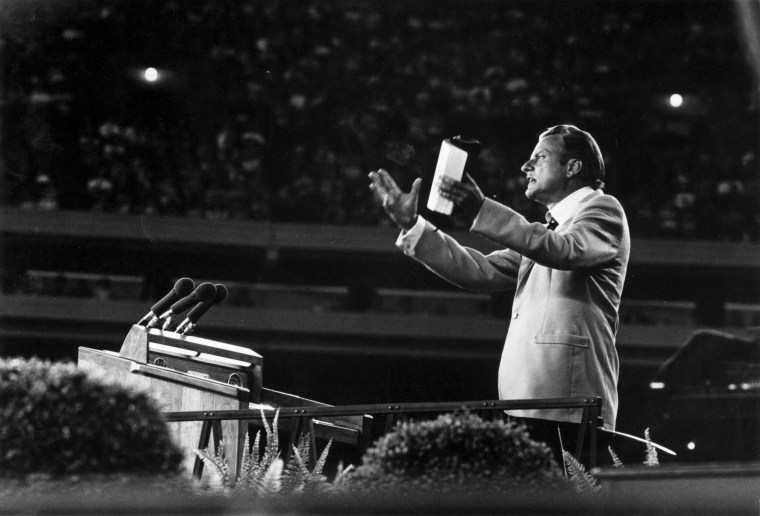Evangelicals across the country are mourning the death of Billy Graham, an influential preacher who died in his home in Montreat, North Carolina, on Wednesday. But while some are celebrating his legacy, others are grappling with the lasting damage his actions have done to their communities.
Over the course of Graham's 99 years of life, he reached millions of Christians around the world and had an outsized impact on the national political landscape. For many lesbian, gay, bisexual, transgender and queer people, however, Graham was a crusader against them, one whose efforts shaped the religious right into an anti-LGBTQ political force.

"Graham was perhaps the most important figure foundation-builder for the evangelical coalition that came together in the late 1970s as the Christian Right," Heather White, a visiting assistant professor of religion at the University of Puget Sound, told NBC News. "He helped unite factionalized fundamentalists, hippie Jesus people and conservative-leaning white Mainline Protestants into an evangelical coalition."
White said Graham also helped connect this coalition to "the political process in general and to the Republican party in particularly, especially through his support for Nixon in the 1960s."
Graham himself had few specific words on LGBTQ people, at least when compared to the rest of his expansive canon, but his disapproval of homosexuality was unequivocal.
“Let me say this loud and clear!” Graham responded to a young woman who wrote to him in 1974 confessing her love for another woman. “We traffic in homosexuality at the peril of our spiritual welfare.” This was after Graham had claimed homosexuality to be a “sinister form of perversion” that was contributing to the decay of civilization, according to the book “Martin Luther King Jr., Homosexuality, and the Early Gay Rights Movement” by Michael G. Long.
Graham also spoke out on the subject of the AIDS crisis, telling a record-breaking crowd of 44,300 in Cooper Stadium in Columbus, Ohio, in 1993, “Is AIDS a judgment of God? I could not be sure, but I think so.”
Graham quickly retracted those remarks, telling a reporter at the Cleveland Plain Dealer that he regretted the comments. "To say God has judged people with AIDS would be very wrong and very cruel. I would like to say that I am very sorry for what I said."
Perhaps this incident is the best analogue for his impact on LGBTQ rights: This was a man who, advocates argue, may not have been extremely outspoken on LGBTQ people, but he left behind an institutional apparatus that has done structural damage to the community.
His organization, the Billy Graham Evangelistic Association, is part of that institutional apparatus. Now spearheaded by his son Franklin Graham, it has provided a platform for virulent homophobia and support for anti-LGBTQ initiatives.
On the organization's website, Franklin Graham has claimed Satan is behind LGBTQ rights and activism, has said there is “no place for compromise” on same-sex marriage and has praised Russian leaders who he said have "stood steadfastly against the rising homosexual agenda in their country."
Garrard Conley, the author of “Boy Erased,” a memoir in which he recounts his experiences in conversion therapy in Arkansas, said Graham’s rhetoric was frequently employed in the liturgy he encountered and in the camp where he was told he could be “cured” of homosexuality.
"I grew up hearing Graham's name referenced in almost every church service, and when I was sent to conversion therapy, his evangelical fire was the model for our change,” he said. “Though many saw Graham as a loving influence, his legacy has been harmful for queer individuals.”
“Don't just take my word for it,” Conley added. “Graham called homosexuality 'a sinister form of perversion,' and never appears to have changed his thoughts on the matter."
Graham's legacy, whether he approved of it or not, includes substantial work in marrying American evangelicalism with the Republican right. This relationship continues to shape the country. Ahead of the 2016 presidential election, his son and heir apparent, Franklin Graham, urged his following to “hold your nose and go vote” for Trump following the release of the Access Hollywood tape in which Trump was heard making his infamous remarks on women.
Partisan divides aside, both President Trump and former president Barack Obama expressed their condolences on the day of Graham’s passing. Though disagreements over how to frame Graham's lifetime of work are vehement, his towering status in the realm of American culture can't be denied.
Toward the end of his life, Graham expressed regret for getting involved in politics, saying in a 2011 interview with Christianity Today he should have "steered clear" of the topic and admitting he "sometimes crossed the line" in that capacity. But much like his sermon in Columbus where he condemned the victims of AIDS, many believe the damage has already been done.


